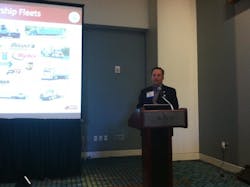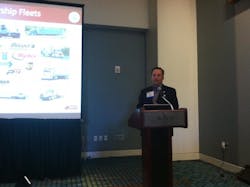A partnership for cutting carbon – and saving fuel
Many folks in the industry might consider any talk of “cutting carbon emissions” to be “dirty words,” especially when mentioned in conjunction with trucking operations.
However, Mike Roeth (seen below at right) – executive director of the North American Council for Freight Efficiency (NACFE) – is trying to change that perspective, in no small measure because his group’s new partnership with the “Carbon War Room” (CWR), a global nonprofit organization established by Sir Richard Branson, the founder of Virginia Atlantic Records and Virgin Atlantic Airways.OK, so yes, it’s perhaps supremely ironic that Branson – a billionaire whose made his fortune in part by burning copious amounts of jet fuel providing a new level of luxury airline service – is involved in a worldwide effort to reduce carbon emissions via the use of what he calls “proven technologies” under current policy landscapes.
Yet NACFE’s Roeth quickly pointed out during a press conference here at the 2014 Technology & Maintenance Council (TMC) annual meeting that cutting carbon emissions goes hand-in-hand with efforts to improve fuel efficiency – for if you burn less diesel, you generate fewer carbon emissions.
Thus the CWR’s goals – whatever one thinks of its philosophical underpinnings – dovetails with those of truckers large and small, for while burning less fuel generates less carbon emissions, it also reduces the amount of money big rig operators spend on diesel in the long run as well.
“If you save fuel, you save money: it’s that simple,” Roeth explained. “CWR as a global nonprofit is good at bringing people and resources together. They can tell the fuel-saving story to a broader audience than NACFE alone; we can get data showing the fuel saving potential of different technologies but they can bring more people together to share that data.”
[As an aside, Roeth provided some insight on the latest “confidence report” NACFE is preparing to publish sometime this April; a report that delves into the potential benefits and drawbacks of anti-idling technology.]
Roeth explained that NACFE and CWR are creating a new joint group called creation of “Trucking Efficiency” that takes up NACFE’s aim to double the freight efficiency of North American cargo transportation.
“New technologies are dramatically helping us wean our dependency on carbon-based fuel sources in a profitable way,” noted José María Figueres, CWR’s president and formerly president of Costa Rica, in a statement. “This collaboration in the trucking sector will build on our successful earlier work in shipping, aviation, energy efficiency in buildings, and island economies where the strengths of the War Room bring together key players and facilitate dialogue and action.”
The “Trucking Efficiency” group will also do what NACFE currently does: providing trucking firms with unbiased assessments of currently-available technologies in terms of their practical potential for fuel savings as well as organizing workshops around the country.
[Roeth touched on these efforts back in 2013 during a special demonstration event hosted by Meritor and Meritor WABCO.]
Roeth said that these “confidence reports” are critical tools for unearthing what he characterized as almost dormant efforts to boost fuel economy along different technological lines in the trucking industry.
“Our ‘secret sauce’ if you will is sharing previously unreleased data – studies that and OEM or fleet may have conducted that then ‘goes quiet’ for a time,” he explained. “Many good ideas often go away simply because they are often too low in volume to produce. So we want to publish data that then helps boost adoption rates, which then lowers the cost of production as volumes increase.”
Roeth pointed to trailer skirts as one example; products that are today often half the price they were three years ago due to increased production rates.
“We believe there’s a ton of data out there that could help ‘scale up’ a lot of different technologies that would help trucking companies save fuel,” he stressed. “For that data to be held back is what’s really frustrating, because a lack of information about the potential benefits and drawbacks is partly what holds back development of new fuel saving solutions.”
We’ll see if CWR’s involvement can help change that.

